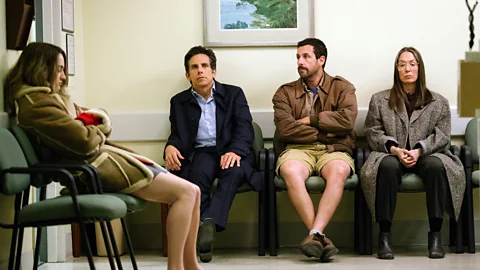The funny side of a mid-life crisis
 Netflix
NetflixNoah Baumbach explores the angst of middle age with a light touch in his new film The Meyerowitz Stories, which has played at the Cannes Film Festival. Nicholas Barber takes a look.
One of the most rewarding aspects of Noah Baumbach’s comedy dramas is that he lets his characters age along with him, in a way which is more common among novelists than screenwriter-directors; each film seems to be his own personable statement on a particular stage in life. s Ha, for instance, was about accepting that you’re an adult, rather than a perpetual student. While We’re Young was about the stage of life when you can no longer tell whether your favourite music is fashionable, unfashionable, ironically fashionable, or somewhere in between. And in Baumbach’s engaging, affectionate, but piquant film, The Meyerowitz Stories (New and Selected), his characters drift further into the murky waters of middle age.
They’re now at a point where their marriages are breaking down, their children are going to kindergarten or university, their health can’t be taken for granted, and their parents’ health is significantly worse. The three Meyerowitz siblings having a collective mid-life crisis are Matthew (Ben Stiller), Jean (Elizabeth Marvel) and Danny (Adam Sandler) – although, because of their dad’s multiple marriages, they are quick to point out that they are actually half-siblings. Baumbach being Baumbach, they are also comfortably well-off Jewish New Yorkers from an artistic family.
The family’s patriarch is Harold (Dustin Hoffman), a respected sculptor who is still nowhere near as respected as he would like to be. (It doesn’t help when someone praises his most famous public sculpture thus: “Hey! I walk past that every day!”) A relentless curmudgeon with a beard that would intimidate an Old Testament prophet, he can’t stop grumbling that he had to work as a college lecturer instead of living off his art, but he is sure that his relative obscurity is everybody’s fault except his own.
He is even more disappointed in his children. Danny, newly separated from his wife, has an endearingly close relationship with his buoyant and gifted 18-year-old daughter (Grace Van Patten), but he’s never had the confidence to exploit his own musical talents. Matthew has distanced himself from his father’s milieu by moving to Los Angeles and making a fortune in ‘wealth management’. And Jean feels sidelined by the rest of the family – so it’s slightly unfortunate that the film sidelines her, too. All three siblings are attached to Harold while resenting his parental shortcomings, but it isn’t until he suffers a serious illness that they are forced to get together and articulate what annoys them so much about him and each other.
There are distinct resemblances to The Royal Tenenbaums in this set-up, but the humour is less eccentric: only Harold’s benignly alcoholic hippy wife (Emma Thompson) comes across as a caricature. The Meyerowitz Stories is a more forgiving film, too. The Baumbach who made The Squid and the Whale and Margot at the Wedding would have punished his characters cruelly for their failings, but today’s Baumbach is more comionate. He is so fond of the Meyerowitzes, as dysfunctional as they are, that it is a pleasure to hang out with them, and the script’s warm glow is intensified by Robbie Ryan’s soft, grainy cinematography and Randy Newman’s jovially clumpy piano score.
As soothing as The Meyerowitz Stories can be, though, Baumbach digs deep enough into his characters to mine some real pain. In a performance that’s bracingly free of affectation or vanity, Hoffman sketches a gruff old eccentric who is as pitiable as he is obnoxious. And Sandler’s hangdog people-pleaser is verging on the tragic, not least because of his horrific taste in facial hair and casual wear. Sandler likes to taunt cinema-goers by delivering one committed and controlled performance in a respectable comedy drama every seven or eight years, before sprinting back to his usual lucrative tosh, and The Meyerowtiz Stories s Punch Drunk Love and Funny People on that brief list.
It isn’t Baumbach’s boldest or sharpest work – there are speeches which sound very scripted and fights which seem preordained – but it’s always amusing and absorbing, and it always feels as if Baumbach is being as sincere about his worries and fears. It’s comforting to know, in these troubled times, that he’ll be around to guide us humanely through the angst of life as a fiftysomething, a sixtysomething, and beyond.
★★★★☆
If you would like to comment on this story or anything else you have seen on BBC Culture, head over to our Facebook page or message us on Twitter.
And if you liked this story, sign up for the weekly bbc.com features newsletter, called “If You Only Read 6 Things This Week”. A handpicked selection of stories from BBC Future, Earth, Culture, Capital and Travel, delivered to your inbox every Friday.
